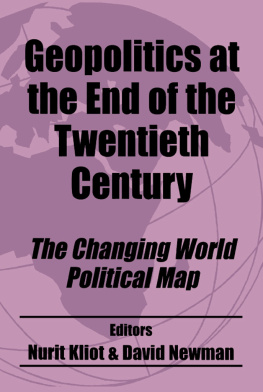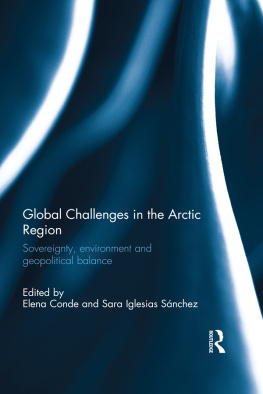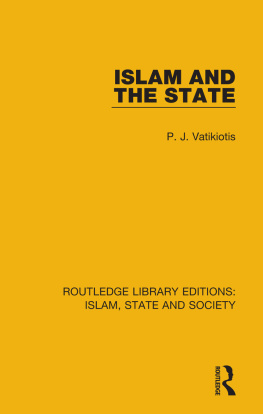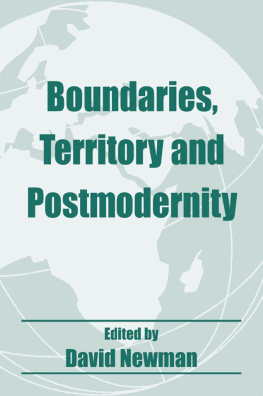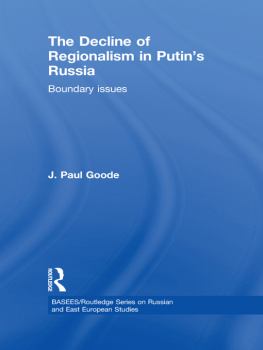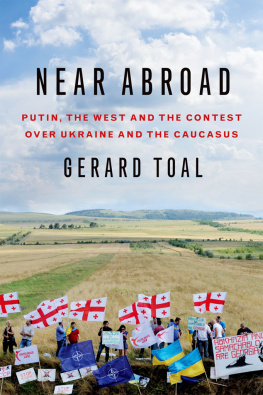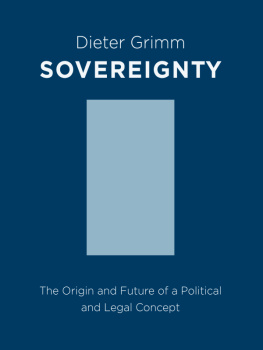Geopolitics at the end of the Twentieth Century
The Changing World Political Map
Part 1: Geopolitics and Globalisation
Part 2: Boundaries and Territory
Books of Related Interest
Land-Locked States of Africa and Asia
Dick Hodder, Sarah J Lloyd, Keith McLachlan, School of Oriental and African
Studies, London (eds)
Boundaries Territory and Postmodernity
David Newman, Ben Gurion University of the Negev (ed.)
Geopolitics and Strategy
Colin S Gray, University of Hull, and Geoffrey Sloan, Britannia Royal Naval
College, Dartmouth (eds)
Geoproperty
Foreign Affairs, National Security and Property Rights
Geoff Damarest, United States Army

First Published in 2000 in Great Britain by
FRANK CASS PUBLISHERS
Crown House, 47 Chase Side
Southgate, London N14 5BP
and in the United States of America by
FRANK CASS PUBLISHERS
c/o ISBS, 5824 N.E. Hassalo Street
Portland, Oregon, 97213-3644
Website: www.frankcass.com
Copyright 2000 Frank Cass Publishers
Transferred to Digital Print 2002
British Library Cataloguing in Publication Data:
Geopolitics at the end of the twentieth century : the
changing world political map. (Cass series in geopolitics ; no. 2)
1. Geopolitics 2. World politics
I. Kliot, Nurit II. Newman, David, 1956 July 4320.12
ISBN 0 7146 5055 2 (cloth)
ISBN 0 7146 8106 7 (paper)
ISBN 978 1 1353 0541 3 (ePub)
Library of Congress Cataloging-in-Publication Data:
Geopolitics at the End of the twentieth century : the changing world political map / editors, Nurit Kliot and David Newman.
p. cm. (Cass studies in geopolitics ; no. 2)
Includes bibliographical references and index.
ISBN 0-7146-5055-2 (alk. paper) ISBN 0-7146-8106-7 (pbk. : alk. paper)
1. Geopolitics. I. Kliot, Nurit. II. Newman, David, 1956- III. Series.
JC319.G486 2000
327dc21 00-025891
This group of studies first appeared in a Special Issue on Geopolitics at the end of the Twentieth Century: The Changing World Political Map of Geopolitics (ISSN 1465-0045) 4/12 (SummerAutumn 1999) published by Frank Cass.
All rights reserved. No part of this publication may be reproduced, stored in or introduced into a retrieval system, or transmitted, in any form, or by any means, electronic, mechanical, photocopying, recording, or otherwise, without the prior written permission of the publisher of this book.
Printed and bound in Great Britain by Antony Rowe Ltd, Eastbourne
Introduction:
Globalisation and the Changing World
Political Map
DAVID NEWMAN and NURIT KLIOT
The world political map has undergone many changes during the past decade. In the wake of the collapse of the Soviet Union, many boundaries have been redrawn, or at least re-emerged, while the territorial configuration of states has undergone change. More significantly, the processes affecting territorial sovereignty and statehood in an era of global flows and technological advance, have resulted in new modes of political organisation locally, regionally and globally. A brief look at a static political map of the world may enable the reader to see the way in which lines have been redrawn, but it hides the more significant and structural changes which have taken place, and which are continuing to take place, in the way that peoples and their governments interact with each other, beyond and between state boundaries.
The collection of essays which follows is based on an international conference, held in Israel in January 1998, examining the changes which have affected the world political map during the past decade. The selected papers are divided into two sections, to be published as two consecutive volumes of the journal, Geopolitics, the first dealing with the relationship between geopolitics and globalisation, the second with the changing role of boundaries in the contemporary world political map. The two sections are not unrelated, as the globalisation thesis infers the end of the nation state and a move into a borderless, deterritorialised world, in which the territorial configuration of state power is diminished as the trans-boundary processes of globalisation take hold. Many of the papers reflect the geographical focus of most of the writers and, as such, question the extent to which globalisation has indeed brought about an end of the nation state and/or has created a deterritorialised, borderless, world.
Defining Globalisation
Globalisation is conceptualized as a process of linkage and interdependence between territories. A common thread running through most of the views on
Barlows working definition of globalisation is that it is a process by which places and institutions become integrated into a system that has global dimensions and from a geographical perspective, two fundamental aspects of the process are scale enlargement in the spatial basis of organisations and institutions and increasing levels and intensity of interconnection across international boundaries.
Globalisation is a hotly contested notion, often reflecting the different disciplinary or cultural perspectives of the proponents of the concept. This is particularly reflected in terms of perspectives on the relationship between the local, the national and the global and the degree to which national states are seen as having been hollowed out. In this respect, the main positions concerning globalisation can be summarised as follows:
1.Globalisation is a process in which capital moves on the globe in search of profit with no constraints on its activities. As a result of this process national states are weakened and deprived of regulatory capacity.
2.While acknowledging the great impact of transnational economies, some authors reject the notion that the globalisation process is accompanied by the hollowing out or weakening process of the national state.
3.Globalisation is a stretching and deepening of social relations and institutions across space and time. Activities and events on the local level are affected by events on the other side of the globe and vice versa.
4.Globalisation processes are explored as a cultural, economic and political process. Culturally, it refers to increasing world-wide sharing of symbols and the awareness of a global social entity.
The challenges to the nation-states in the latter part of the twentieth century include: the internationalisation of economic activities and the growth of transnational companies, migration, new technologies, the development of new political movements, demands for regional and local autonomy and religious movements. Following Fukuyamas 1992 essay on the End of History it was claimed that Liberal Democracy now dominates the political culture in most parts of the world. But, according to Johnston
Economically, the effects of globalisation are very significant. So fundamental have been the economic changes of space-time compression of measures, such as communication and computer technology, that Luttwaks forecast that geo-economics would displace geopolitics as a global analytical framework whereas geopolitics is state-based.
Critiques of the globalisation concept, do not accept the notion whereby the nation-state is hollowed-out. Hirst and Thompson insist on the continuing significance of the nation-state.

